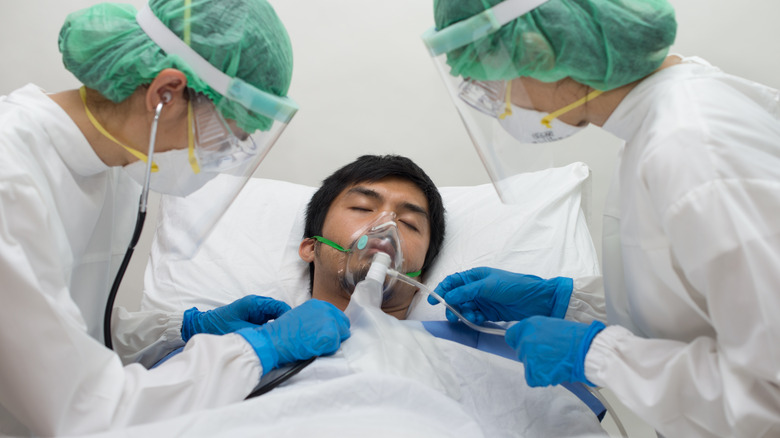Why The Spike In COVID-19 Hospitalizations Is So Concerning
The spread of the delta variant has increased COVID-19 hospitalizations to levels not seen since January, a time when the coronavirus vaccines were not yet widely available (via Washington Post). According to the latest data provided by the Department of Health and Human Services (HHS), more than 100,000 people in the U.S. are currently hospitalized for COVID-19.
This spike in coronavirus cases is putting overwhelming strain, once again, on the healthcare system, ultimately limiting the ability of hospitals to treat and care for patients suffering from non-COVID related medical conditions. People needing emergency care after a serious car accident or who are suffering from a heart attack, stroke, or other serious condition are more likely to wait a long time for treatment or an intensive care unit bed, medical experts tell Healthline. Nearly 80% of all ICU beds in the US are currently occupied — over 30% of these are being used for COVID-19 cases (via HHS).
"People who have something that could be cancer, critical heart disease or [other serious condition] can't wait that long to get care," Dr. Greg Martin, a professor of medicine at Emory University School of Medicine and president of the Society of Critical Care Medicine, tells Healthline. "That has a ripple effect — it has implications for not just the COVID patients, but for everyone else in the community around them."
Medical experts also believe that the delay of elective procedures, annual screenings, and primary visits could have long-term impacts on people's health and quality of life, especially those who suffer from chronic or underlying conditions, such as diabetes and heart disease.
Oxygen supplies are depleting fast
According to CNN, this latest COVID surge is having a significant impact on the availability of oxygen, particularly in the South, where several hospitals in Florida, South Carolina, Texas, and Louisiana are at risk of using their reserves — or running out of oxygen completely.
"Normally, an oxygen tank would be about 90% full, and the suppliers would let them get down to a refill level of 30-40% left in their tank, giving them a three- to five-day cushion of supply," Donna Cross, senior director of facilities and construction at Premier, a healthcare performance improvement company, tells CNN. "What's happening now is that hospitals are running down to about 10-20%, which is a one- to two-day supply on hand, before they're getting backfilled," Cross says.
Dr. Ahmed Elhaddad, an intensive care unit doctor in Florida, tells CNN that this surge of COVID-19 diagnoses and deaths is a direct result of people choosing not to take the vaccine. "There's no magic medicine. ...The only thing that we're finding is that the vaccine is preventing death. It's preventing patients from coming to the ICU," Elhaddad said.
According to the most recent CDC data, approximately 52% of the total U.S. population is fully vaccinated and close to 62% has received at least one dose.


